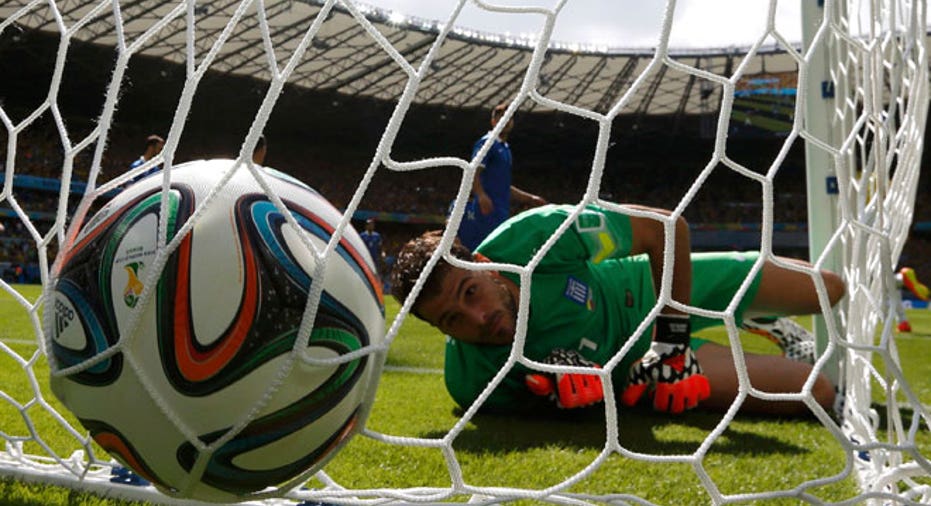Four Small Business Lessons from the World Cup

World Cup fever has gripped the U.S. The reasons for this are many. First of all, soccer – futbol, to the rest of the world – has grown incrementally since the legendary Pele put the sport on the map in the United States during the 1970s.
According to the latest figures available from U.S. Youth Soccer, more than 3 million boys and girls are playing the sport across the country, with more than one-third concentrated along the East Coast. Elsewhere, the states of California, Texas and Washington each boast more than 100,000 youth participants, whereas the total for 40 years ago in 1974 was only 104,000 for the entire country. International stars, such as David Beckham and Thierry Henry, have injected much welcomed glamour into the MLS (Major League Soccer) in the U.S. in the past few years.
Social media and ever increasing access to news from across the globe through the Internet have fueled interest in top leagues, such as the English Premier League (EPL), La Liga (Spain) and Serie A (Italy).
Lastly, Americans have been bombarded by World Cup-related marketing campaigns by major corporations, ESPN coverage of matches, and countless tweets, Instagram and Facebook posts. Meanwhile, the somewhat surprising advance of Team USA to the “knockout” round of the tournament has caused even non-sports fans to jump on the bandwagon in much the same way that the Olympics spurs interest in sports such as swimming, gymnastics and ice skating.
U.S., Brazil and Portugal shirts have flown off the shelves at sporting goods retailers. Sports bars across the country are reaping the benefits of showing the games on their big screens. Lots of money is being made on the World Cup.
“The American people are very patriotic and they have rallied around this team and the sport. The World Cup brings lots of new customers in,” said Shaun Clancy, owner of Foley’s NY Pub & Restaurant, which is best known as Manhattan’s top baseball bar. “We’ve seen a big uptick in business during World Cup matches, particularly when the U.S. plays. The tournament also attracts people who want to watch Germany, Belgium or Brazil. If they enjoy themselves, they may come back to watch baseball, the NFL or other sports, too.”
The World Cup’s marketing juggernaut provides a number of lessons for small business owners:
Diversity Is More Important Than Ever Before
While teams in the tournament represent individual nations, the squads include players whose associations with their “home” country are somewhat tenuous. More than half of the Algerian team’s players were born in France. The U.S. team is coached by Jurgen Klinsmann, a German citizen who starred as a player for the World Cup winners in 1990, and in ‘94, and ‘98. Having diversity in the workplace makes teams and companies stronger.
You Will Encounter Ups and Downs
It is important in business to have resilience. The U.S. team was not picked to win the World Cup and many people doubted that they would advance past the “Group of Death” that included Germany (ranked No. 2), Portugal (No. 4) and Ghana, which had knocked the U.S. out of the past two tournaments. The Americans beat Ghana, bounced back after blowing a 2-1 lead against Portugal in the final seconds, and played sufficiently well versus the Germans to advance to the next round.
Take Advantage of Buzz
Social media is driving much of the interest in this year’s World Cup. Fans are able to watch in real time because Brazil is only one hour ahead of the East Coast of the United States. The thrilling U.S.-Portugal match featuring international star Ronaldo, perhaps the world’s best and most recognizable player, set viewership records because it occurred during TV prime time on a Sunday night. People tweeted their thoughts during the game in real time (using #FIFAWorldCup) and posted their glee and disappointment on Facebook and other social media. In comparison, South Africa, the 2010 host, was six hours ahead of New York and nine hours ahead of the West Coast. A 4 p.m. match in South Africa thus aired in the early morning for Californians.
Go Above and Beyond the Expected
If you build a business, you must be the first in and the last to leave. Soccer matches are nominally 90 minutes, but each contest continues into “injury time” that tacks on a few minutes at the end of regulation. Portugal managed a tie against Team USA in the last 30 seconds of injury time in a game the Americans thought they had won. The Netherlands toppled Mexico during extra time to advance, and host nation Brazil escaped an upset by defeating Chile in a shootout. In all of these matches, the teams had to go above and beyond their normal limits to be successful. The same is true for small business owners.
No matter what the outcome is, the World Cup has been a boom to many American businesses and offers marketing and operational lessons that can be learned long after the roars have subsided. Entrepreneurs should take advantage of these key learnings.
Rohit Arora is co-founder and CEO of Biz2Credit, an online resource that connects 1.6 million small business owners with 1,300+ lenders, credit rating agencies and service providers such as CPAs and attorneys. Since 2007, Biz2Credit has secured more than $1.2 billion in funding for thousands of small businesses across the U.S. Follow Rohit on Twitter @biz2credit and on Facebook https://www.facebook.com/biz2credit.



















